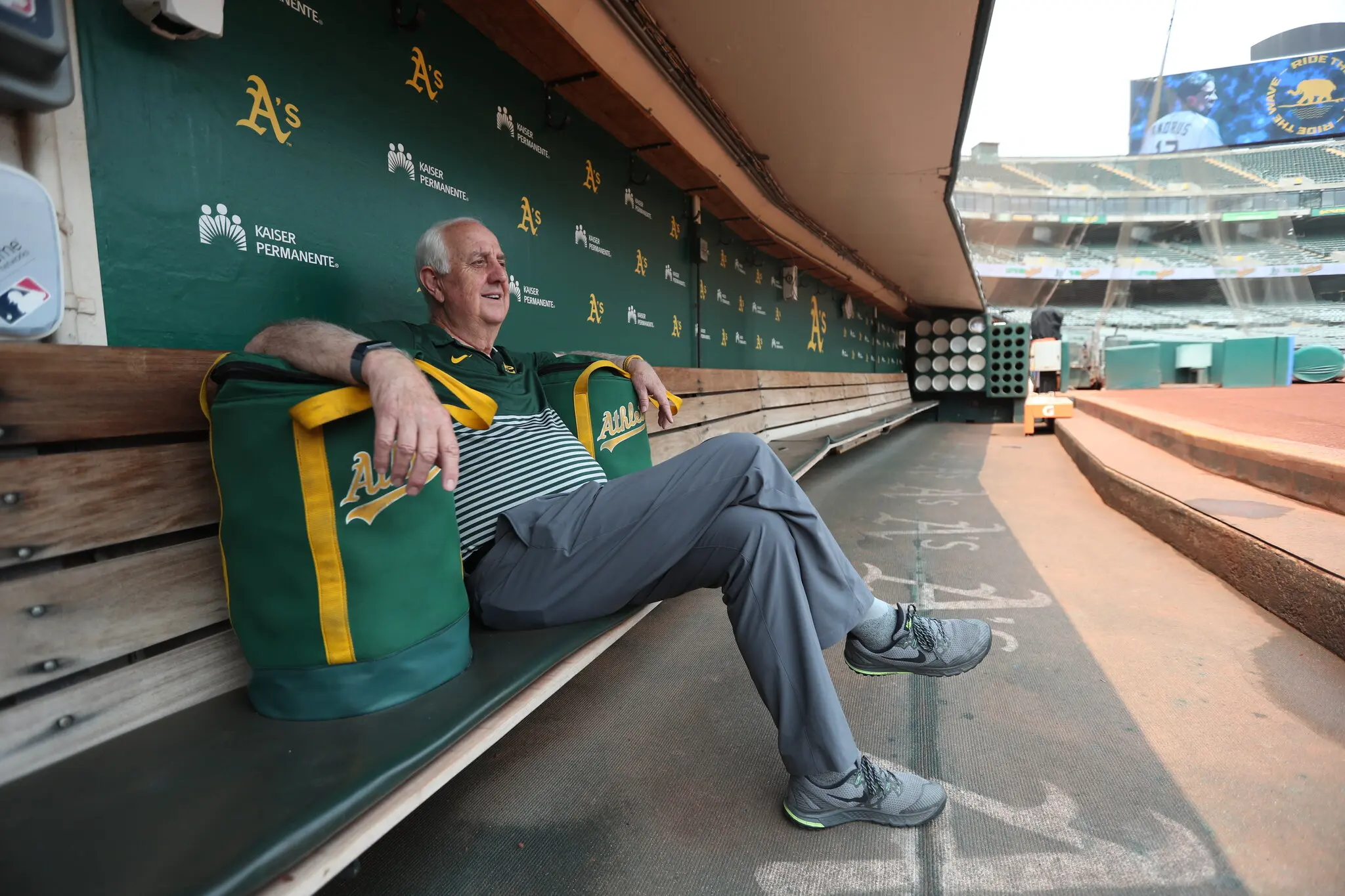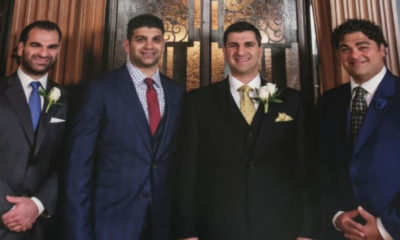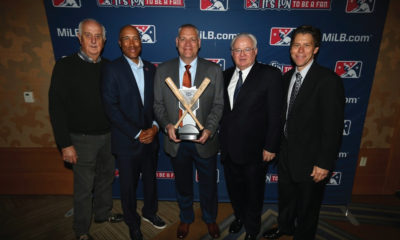The Nationals employ more than 1,100 people who never get an at-bat or throw a pitch
Story by Barry Svrluga | September 22, 2014
Three buses filled the concourse outside the home clubhouse at Nationals Park, visible to only a few security guards and those who would climb aboard for the ride to Union Station, for the train to New York, for the games in Queens, for the flight to Atlanta and on and on, not to return for 11 days. It was two minutes before 8 p.m. on a Wednesday earlier this month, and the whiteboard inside the clubhouse — where attendants swept away the last bit of detritus from that day’s game — was red-letter clear about what followed: BUS 8:10. But all the meal money hadn’t yet been given out, so Rob McDonald remained behind his desk in his office, just at the top of the stairs that lead to the home dugout.
The stream of players came randomly, each grabbing an envelope, each heading to the players’ bus. By 8:02 p.m., General Manager Mike Rizzo took the first seat in the first row of the staff bus, just under the red sign that flashed “Watch Your Step,” just behind the driver, just across from Manager Matt Williams, just in front of 29 other Nationals employees, none of them players, each with a role. As the clock ticked toward departure time, McDonald gathered two of the three bus drivers just outside the door.
Williams likes the players to depart the buses first, to board the train or plane before the coaches and the staff. So for McDonald, it mattered which bus pulled in where. It mattered which door opened when. There are no small jobs.
“Perfect,” McDonald said, message delivered. “Thank you, guys.”
McDonald climbed the steps and took his seat across from Mike Wallace, the bespectacled, omnipresent figure known forever as “Wally.” Nine hours earlier, Wallace stood outside the Nationals clubhouse, clipboard in hand, watching as a mountain of black suitcases grew higher and higher, seven luggage racks obscuring the sign on the wall commemorating the 2012 National League East Division championship. Wallace and his staff helped load those bags onto a truck, which drove during that afternoon’s game against the Atlanta Braves. When the Nationals arrived at their Madison Avenue hotel, they would go to their rooms, and their bags would be there, waiting. Wallace and McDonald have a goal: When a player brings his luggage to spring training, he shouldn’t have to pick it up again until the fall, until the final out.
“They should forget how heavy their bags are,” McDonald said.
A baseball season, stretching from the tail of one winter to the cusp of the next, erodes the bodies and minds of the men who play. How they handle those demands can determine their performance, there for the world to see nearly every single day.
What’s not plain to the eye is what gets them to that position. The Nationals, from the lowest levels of the minors to the major league team, control some 200 players, the stars of the show. Yet they employ more than 1,100 people who never get an at-bat or throw a pitch, whose names are never known. Rank them in importance, top to bottom, and Rizzo — who constructs the roster and oversees the entire operation — would be up there, as would Williams, who runs the games. Not far behind, though, would be McDonald and Wallace, whose titles — vice president of clubhouse operations and team travel and clubhouse and equipment manager, respectively — seem nebulous. Their missions are all-encompassing and essential.
“Picture this team as a band,” McDonald said. “I’m kind of the tour manager. I kind of oversee everything. I make sure we go in the right direction, try to trouble-shoot, try to make sure the people who are involved with the band are happy, and they can put on the best show possible.”
“I tell people that if someone came in here naked, they could go out and play baseball fully equipped outside in front of a crowd,” Wallace said. “Basically, we want to make it so that the only thing the player has to worry about is performing on the field, and that anything and everything else that they need — that we take care of it and make sure that they have it.”
None of the Nationals’ 33 flights or two train trips of or five bus charters over the course of the season would happen without either man. “Guys like that? More important than your seventh-inning reliever,” said Braves Manager Fredi Gonzalez, who recommended McDonald for his first big league job. The last of the Nationals’ 12 road trips would go through three cities and involve one train ride, three flights, 46 bus rides, 78 passengers, 25 equipment trunks, six sets of golf clubs, 70 equipment bags, one massage table, 125 pieces of luggage, including two guitars. What could go wrong?
“There’s always something,” Wallace said.
It is their job to take each something seriously but casually, urgently but in control. McDonald’s memo of guidelines for how the clubhouse and travel staff should conduct itself includes, among the 14 points, “develop a high level of concentration” and “be quick, but not in a hurry.” Each task, however esoteric, must be taken handled professionally. Jayson Werth needs a microwave in his hotel room in New York? Check. Drew Storen forgot to put in his request to leave tickets for his family? No problem. Steven Souza needs to find a place to work on his Chevy. Rob’s got a guy. Someone needs a button sewn on the shirt he intends to wear on the road trip? Wally has his needle and thread at the ready. Rookie outfielder Michael Taylor needs a place in New York to quietly get a meal? Done.
“He’s got to deal with 25 prima donnas that get paid a lot of money that want everything that they want,” veteran Ryan Zimmerman said of McDonald, “and he’s got to make them all happy. That can’t be easy.”
When the staff bus pulled in to Union Station at 8:25 that night, McDonald and Wallace hopped off. The players moved seamlessly through a mostly empty garage, down a flight of stairs, and out Gate E to the chartered train, three cars long. They didn’t know, but nine cases of champagne — including one of Dom Perignon — had been packed in the truck hours before with their luggage, headed up the New Jersey Turnpike ahead of them. Life on the road can be routine, monotonous. In the September of a lost season, it can be deadening. This final trip — New York, Atlanta, Miami, champagne in tow — promised something more.
‘Controlled chaos’
When the Nationals players gathered for the final game of their most recent homestand — a 4:05 p.m. start against Atlanta — they walked through the concrete concourse, added their roller bags to Wallace’s pile of luggage, then entered the clubhouse. On the whiteboard just outside the main locker room, McDonald had neatly printed the dress code decorum, unchanged from the beginning of the year:
Train Trip – Jeans & Dress Shirt
Plane Trips – Slacks, Dress shirts, Dress shoes
On the floor in front of each locker sat a blue bag adorned with a curly W. Into each would go baseball gloves, spikes, flip-flops, socks, sunglasses, shorts, braces, cups, ointments, lotions — the stuff the players need at the ballpark. Get-away day, as such travel days are known in the majors, is scarcely a get-away for Wallace and his staff of four full-timers and eight seasonal workers, many of whom double as bat boys.
“Controlled chaos,” Wallace said.
He is 55 and has been in major league clubhouses for nearly four decades, ever since his mother took over laundry duties when the Washington Senators moved to his home town of Arlington, Tex., and became the Texas Rangers. Back then, at 14, he made $4 a day for putting out laundry, shining shoes, running errands, whatever players needed whenever they needed it. The postgame spreads consisted of chips and dip, the clubhouse had one tap for soda and another for beer, players used one pair of shoes for batting practice and another for the game, and that was it. Wallace took Gaylord Perry’s Lincoln Continental to his junior prom, got Izod shirts and Italian leather zip-up boots from Jim Fregosi, babysat for Buddy Bell and Sandy Alomar — players whose sons became major leaguers. Those sons have now retired, too.
Wallace was with Bo Jackson in Kansas City, won a World Series with the Florida Marlins in 1997, endured the nomadic life of the Montreal Expos in the early part of this century — when some “home” games were in Puerto Rico — and helped the Nationals transition first to RFK Stadium, where he slept during the summer of 2005, then to Nationals Park.
And for all the differences in eras and cities, little has changed about the flow of the job.
“It can have a tendency to become Groundhog Day-ish,” he said. “But every day, you don’t know how the game’s going to end. It’s not like any other 9-to-5er.”
Off to the side of the clubhouse, three chefs worked on the pregame meal. Healthy options — a chicken and a fish entree, sandwiches, cereal, salad — are offered every day. In 2010, when Werth was with the Philadelphia Phillies and approaching an offseason in which he would be a free agent, he stopped during batting practice one day and asked Adam Dunn, then the Nationals first baseman, how he was treated in Washington. Forget the money, for a second. How is the organization?
“Sometimes, guys’ll say, ‘Ehhhhh,’ ” the right fielder said. “You don’t want to hear that. But he surprised me. He said he was treated great. He said he had everything he needed, that the people were great. That makes a difference.”
When Werth signed with the Nationals, he went about pushing for further improvements. The kitchen staff is one element. There is now a team nutritionist, a massage therapist, a barber and a car washer available at least once a homestand. “If we forgot something at home,” said reliever Tyler Clippard, “we can ask one of these guys to run and get it, and they will. There’s nothing they won’t do.”
It’s not free, though. Each major league club charges clubhouse dues, so each National pays $95 per home date, $60 on the road to the visiting clubhouse manager. At the end of the year, most players will tip the home staff, maybe 20 percent of the dues for the year. That’s roughly $12,500 per player in dues per season, pre-tip. Most believe it’s well worth it.
“The reality is,” Storen said, “I’m pretty terrible at life during the season. These guys take the pressure off.”
When the game against the Braves began, Storen came into the clubhouse wearing leggings, his uniform pants hanging in his locker. Fellow reliever Rafael Soriano sank into a couch, the MASN broadcast on a flatscreen in front of him. The end-of-the-game relievers generally hang out in the clubhouse in the early innings, and there’s traffic all the time — Werth coming in between at-bats to cool off, Anthony Rendon trying to shake a bug that kept him out of the lineup, Ian Desmond looking for a new bat.
The voice of radio play-by-play man Charlie Slowes pumped through the clubhouse speakers while Wallace’s staff packed what it could during the game. Three giant washing machines churned through the uniforms and undergarments soiled during batting practice. McDonald sat in his office, chatting with Jordan Zimmermann, who had started the game the day before and idly tossed a baseball in the air, catching it in his bare hand, tossing it again.
This is a major part of the job: establishing relationships.
“I try not to ask them baseball questions,” McDonald said. “They get enough of that.”
The game is McDonald’s down time, practically the only time of day when someone isn’t asking for something. But as the late innings descended, and the road trip grew closer, the bustle picked up. Wallace hardly noticed as Bryce Harper slugged a ninth-inning homer off Braves closer Craig Kimbrel, but he slowed to watch Danny Espinosa’s at-bat before moving into the clubhouse to wheel out a cart of equipment. At 7:06 p.m., Kimbrel recorded the final out of a 6-2 Washington loss, and the Nationals slowly lumbered up the stairs to the clubhouse, toward the road.
“Ready to get outta here?” McDonald called. Each player handed his game hat to an attendant, to put it in a heavy metal box used just for caps. No movement was wasted.
“Andrew, crush the hamper and see if it’ll close,” Wallace said. “Adam, check the staff room and see if there’s any laundry.”
In the laundry room, Taylor, one of the September call-ups unfamiliar with big league life, fiddled with a hand-held steamer in hopes of smoothing out his plaid shirt. Out of nowhere arrived Ryan Wiebe, an assistant who helps McDonald with the travel and Wallace in the clubhouse. Wiebe switched the machine on and began working on the shirt.
“You got to remember: Treat people how you want to be treated,” McDonald said. “Treat him as if it’s your kid or your cousin or your brother. What would you do for them? It doesn’t always work out that way. Everyone frustrates you at some point in time. It’s hard to treat Jayson Werth like he’s your son. But that’s how you conduct yourself.”
The long season
In February, McDonald gathered with his family in Arizona, where his parents now live, to watch the Super Bowl. His daughter Riley was about to turn 1. His annual rhythms — essentially unchanged since the Montreal Expos moved to Washington — had always mirrored those of baseball around baseball’s rhythms. But here was this little girl.
“That’s the hardest part,” he said. “You’re away, and you come back, and she’s changed. I try to turn it into a positive, like I can notice the differences because I’m not there every day. But you can’t get that time back.”
The Seattle Seahawks beat the Denver Broncos on Feb. 2. On Feb. 4, McDonald was due in Viera, Fla., to prepare for spring training. The season wouldn’t start for another eight weeks. During the Super Bowl, McDonald’s brother began doing the math.
“Basically,” he said, “you’re on call till October.”
He could only shrug. In a way, spring training, which seems like such a slow build for the rest of baseball, is the most hectic time of year for McDonald and Wallace. McDonald spends the months after the season preparing for the next, booking hotels, arranging charter flights, setting up apartments and hotels for players and staff during spring training. Wallace and his main assistant, Dan Wallin, use that time to take inventory, to order new equipment for the next year, to arrange the shipment of gear to Florida and back.
When players begin to trickle in, the needs come in a rush. There is no lull. “You’re excited to see everybody, to see how the players look, to see what people did in the offseason,” McDonald said. “And you get in a rhythm once the season starts. But to be honest, by now, I’m pretty fried.”
He said this in September, eating a salmon salad at Union Market, not far from his home in the District’s Brookland neighborhood. McDonald grew up outside St. Louis, went to Northern Illinois to play quarterback, moved to wide receiver, then suffered a back injury that ended his football career. He transferred to the University of Arizona, studied pre-law, and decided he preferred the pursuit of a career in pro sports over law school. So he worked in Tucson rec leagues, then for a sports radio station in Phoenix, then for the Arizona Diamondbacks in spring training before landing in the Arizona Fall League, where baseball’s best prospects go each year.
Gonzalez managed the team to which McDonald was assigned. Carlos Tosca, now Gonzalez’s bench coach in Atlanta, was the bench coach back then, too. And McDonald did whatever they asked.
“He took it real seriously,” Gonzalez said. “You asked him to do something — picking up the trash, grabbing laundry, whatever — he was full tilt going after it. He’d get it done and do it happily.”
McDonald so impressed Gonzalez that when the latter ended up as a coach with the Florida Marlins, he recommended his young protégé. McDonald, now 42, has been in baseball ever since, first as an intern in the Marlins’ baseball operations department, eventually, in 2002, as the Expos’ traveling secretary. He was 30. He now knows just about everybody in baseball, has relationships with players that date back decades. But when he came to Montreal, Omar Minaya — the general manager inserted by Major League Baseball, which owned the Expos — gave him some advice.
“No matter what happens,” Minaya said, “you can’t lose the trust of that clubhouse.”
No one knows what goes on around the Nationals more intimately than McDonald. If a potential free agent signee comes to Washington for a physical, McDonald arranges the flight, the car service, the appointment, the hotel. If a player is sent to the minors, McDonald has the conversation about his lease situation in Washington, whether he needs a rental car in Syracuse or Harrisburg or wherever. If a player’s wife and family are meeting the team on the road, McDonald books an adjacent room. When it’s time to distribute meal money for the road — $95 a day — McDonald hands out the envelopes. He knows who needs a gluten-free meal on the team flight, who is obsessed with fantasy football, who arrives at the ballpark early and who stays late.
“You really have to have a lot of discretion in what you do talk about and what you don’t talk about,” McDonald said. He will not bring every little problem to Rizzo. “You got to put out the fires. You have to take the pressure off of him as much as you do the players.”
So from his spot as gatekeeper, concierge, liaison — “Kind of like our ‘slash,’ ” Storen said — McDonald has not only watched as the Nationals have transformed from baseball’s Island of Misfit Toys into an organization that expects to compete for a division title every season, but he has helped shape it, in tiny but tangible ways. When the club contracted with a small charter company, and that company couldn’t provide a replacement plane when one broke down — forcing the Nationals to sit on the tarmac for six hours, then return home at midnight before flying the next day — McDonald convinced the club it needed better services. The Nationals now charter with United.
“If Ian Desmond gets offered $100 million [as a free agent], and we offer him $80 million, it’s easy,” McDonald said. “You go with the $100 million. But if he gets offered $100 million from both of us, and his wife is comfortable and his family likes it here and he knows the way he’s going to be treated — to us, that could make a difference.”
It is why he arrives at the ballpark between 10 and 11 a.m. on most game days, maybe nine hours before first pitch, an hour before the coaching staff starts to trickle in, a couple of hours before the players show up. It’s why, when he got off the elevator and walked across the marble floor in the lobby of the New York Palace Hotel, his phone was to his ear.
“Bus is at 10:30,” he said. This was Sunday, the last day of a four-game series against the Mets, the day for travel to Atlanta. One bus, with the staff and a few early-rising players, had departed for CitiField at 9 a.m. Wallace was in the lobby, working with white-gloved bellmen to check off each piece of luggage headed to an equipment truck, checking his list. He grabbed his own phone, and listened.
“I told him to put a tag on it,” he said. He listened some more. “I’ll see if I have another one,” and he turned to his own roller bag, moved aside his copy of “A Game of Inches: The Stories Behind the Innovations that Shaped Baseball,” and rummaged for a tag.
“The old saying: You can lead a horse to water,” he said.
At that moment, the Nationals’ magic number to clinch division was six. The second bus departed, right on time.
On the road again
By the time United flight 1809 pulled slowly into Gate D8 at Atlanta’s Hartsfield-Jackson International Airport, the concourse was nearly empty. The largest screen at the Atlanta Braves All Star Grill, adjacent to the gate, had long since switched off the Braves’ miserable 10-3 loss to the Texas Rangers, completing a sweep. The Nationals had quickly overcome their own issues — a plane damaged by a mobile luggage ramp at New York’s LaGuardia Airport, a switch to a new Boeing 737, a flight that took off just after 6:30 p.m., about an hour late.
Two buses waited on the tarmac, and a staircase wheeled over to the plane.
“People ask how often we play, which is every day, and they hear about how much we travel, which is all the time, and they’re like, ‘Oh my god. I had no idea,’ ” Werth said. “ ‘You must be exhausted.’ And then I’m like, ‘Well, you don’t know how we travel.’ ”
More photos: Sweating the small stuff
Mike Wallace sews a button on a player’s shirt. (John McDonnell /The Washington Post)
For each flight, McDonald arranges with the Transportation Security Administration to have officers and screening equipment at the ballpark, so the Nationals never have to wait in line at a terminal. The buses take them directly to the plane, so there’s no interminable walk at Dulles, no train ride in Atlanta.
When the plane’s door swung open, Rizzo came down the stairs first and headed left to the buses. Wallace came next, and headed right, underneath the plane to the cargo hold. A single truck awaited at the end of a conveyor belt. Here came the champagne. It was 9:05 p.m.
The Nationals, buoyed by their victory over the Mets, a celebratory flight and the potential accomplishment ahead, all but bounced down the steps, the rookies dressed in leotards as part of baseball’s annual ritual of light hazing. By 9:13, the buses took off, headed to the Ritz-Carlton Buckhead. Wallace remained under the plane, grabbing bag after bag with the United staff.
One problem: There was only one truck. “There was a mix-up,” Wallace said. “Put it that way.” The upshot: The truck had to travel to the team hotel with the players’ luggage, unload, then return to the airport, pack up the equipment and drive to Turner Field, where John Holland, the manager of the visiting clubhouse for the Braves, awaited with his staff of seven, which passed the time by playing football in the concourse. At 11:05 p.m., the truck backed up to the door to the clubhouse, and something approaching a sporting ballet began.
“The ones that say ‘V’ at the top are video,” Wallace said. The Nationals’ gray road pants went into the wash immediately, as did the red alternate jerseys they wore in New York. Each equipment bag landed directly in front of each player’s locker, and clubhouse attendants began meticulously unpacking them, hanging warmup jerseys and T-shirts on hangers, belts on hooks, placing deodorant and sunglasses and socks in each locker. By 11:48 p.m., the pants were out of the dryer, ready to be distributed. Wallace and Holland began discussing a potential division-clinching celebration.
“If it comes down to Wednesday,” Holland said, “I’ve got the Mets coming in here that night.”
Wallace knew what that meant: cleaning the beer and champagne out of the carpet, making it look new and unaffected for a team long since eliminated. At 12:25 a.m., the work done, one of the Braves’ clubbies left Turner Field with Wallace, ready to drop him at the team hotel.
“Well,” Wallace told Holland, “we’ll hope for Tuesday.”
Hope, in baseball, has little correlation to reality. But when the Nationals won that Monday night, they showed up Tuesday with the chance to clinch. Holland’s staff had long since installed hooks above each locker, from which the sheets of plastic that protect the players’ lockers would hang. By the sixth inning that night, the plastic was up, the champagne chilled.
“There are guys in my position who always say, ‘Ah, October’s the hardest time of year,’ ” said McDonald, who faced the prospect of booking hotels in multiple cities for stays of undetermined lengths, of scheduling charters before game times are determined. “I don’t’ look at it that way. We go through all this other stuff to be able to play an extra month of baseball. I’ll take that grind of the summer every time if I know I’m going to play in October. I’ve been through enough seasons where we’re 20 games back.”
Tuesday night, the Nationals won. There was no flight to take, no pressing matter which to attend. As the celebration raged in the middle of the clubhouse, McDonald stood at the edge, back up against the sheets of plastic, watching the frothy mayhem. He smiled, accepted handshakes and hugs that came his way. “I never played a game,” he said. And yet the players in the pile wouldn’t have been there without him.

Clubhouse Manager of the Year
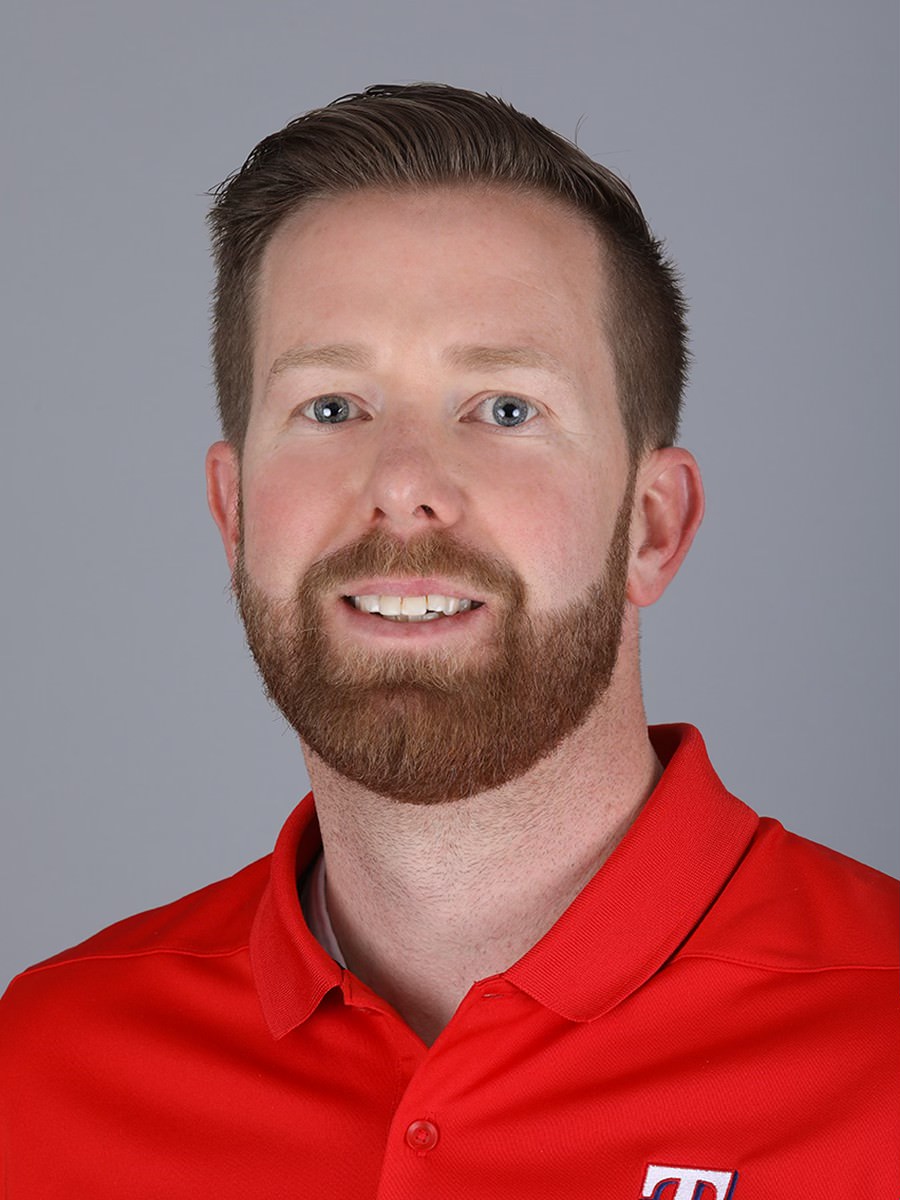
BRANDON BOYD Texas Rangers Home Clubhouse Manager of the Year
Clubhouse Manager of the Year
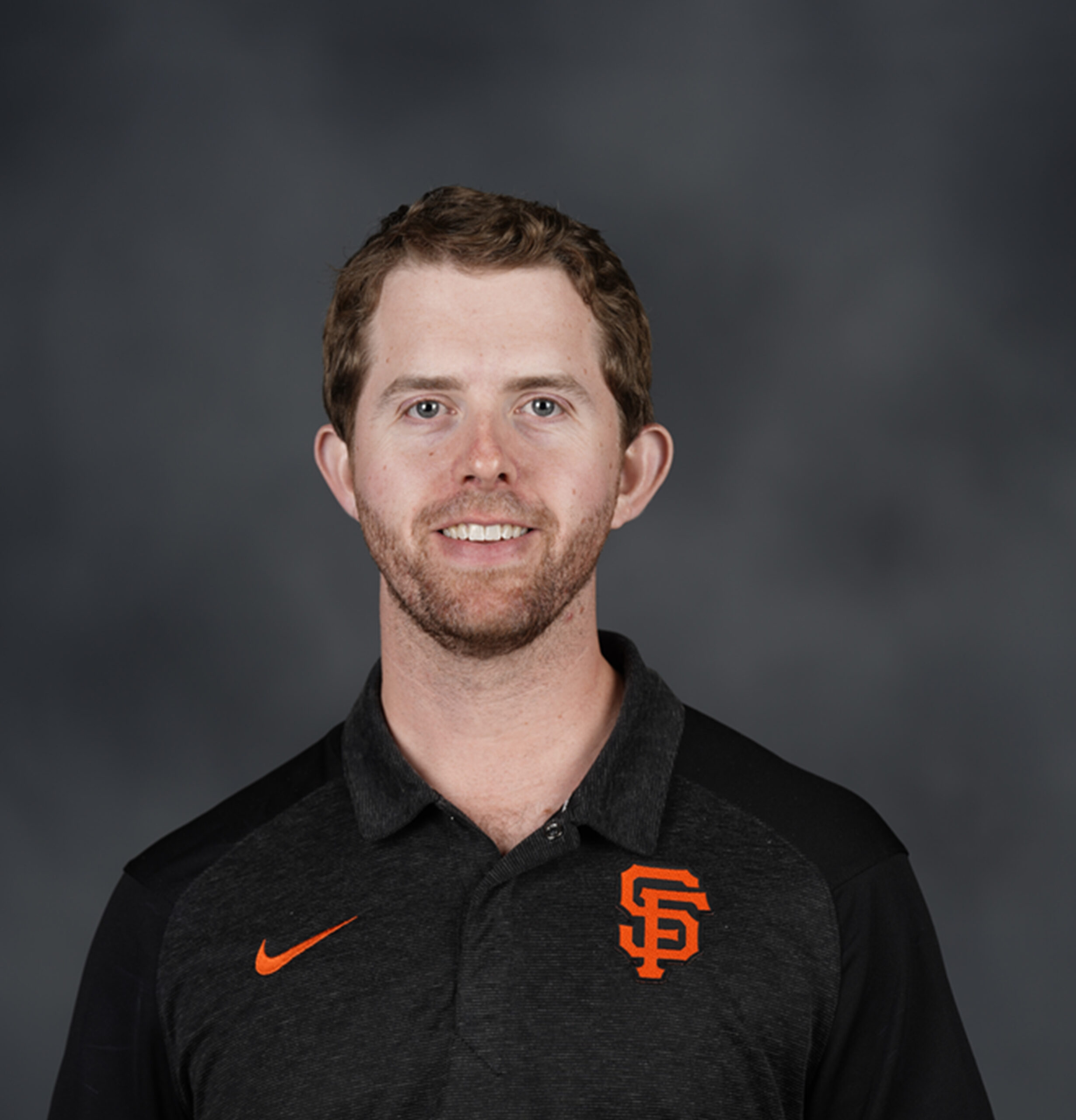
GAVIN CUDDIE San Francisco Giants Visiting Clubhouse Manager of the Year































